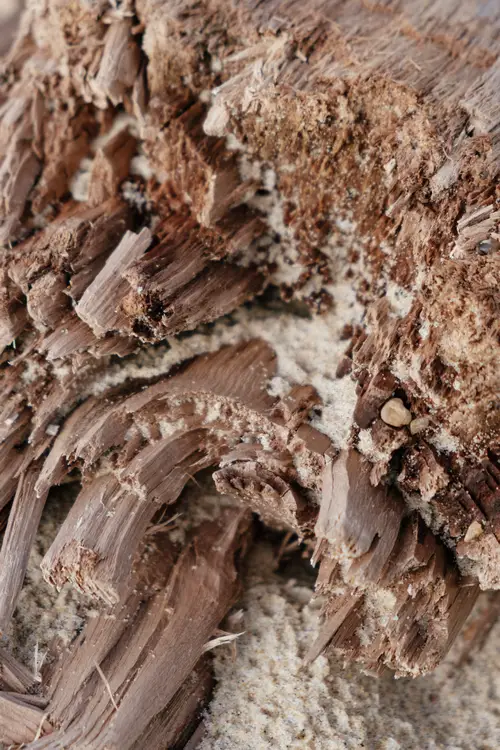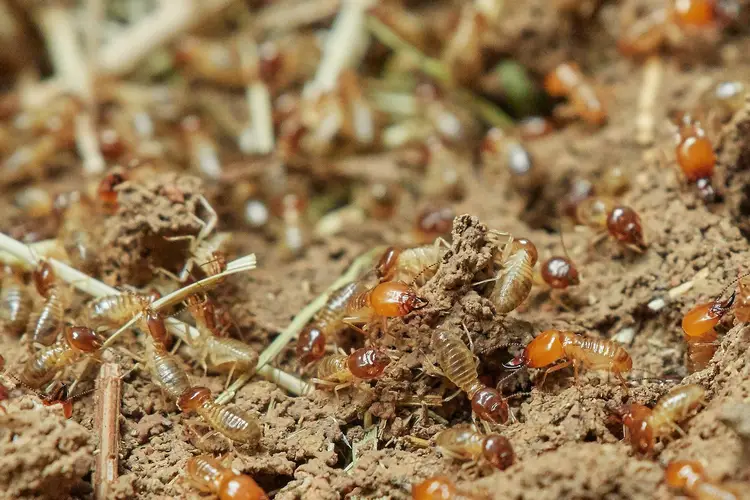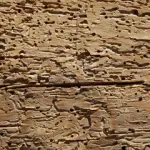
What do you do if you’ve found the perfect new home to buy and you discover it has been treated for termites. Termite damage can be structural and it’s important the termite treatment has been done properly. This is why it’s important to know whether you should buy a house that has been treated for termites.
It’s okay to buy a house that has been treated for termites, but only after an inspection to confirm the termite treatment was successful and the structural integrity of the house is sound. Most houses in areas where termites are present will require treatment at some stage, so this shouldn’t put you off buying.
Buying a house that has previously had termites
Before buying a house that has previously had termites, you should make sure of the following:
- Confirm the termite infestation has been treated properly by a licensed pest control professional.
- Make sure the termite infestation has been eradicated inside the house and around the home and in the garden.
- Have all the problems around the house that led to the termite infestation been fixed-up, to help avoid future termite infestations.
- Make sure that any wood that’s been damaged by termites has been repaired. Be careful with this, as termite damage is mostly not visible to the full extent of the damage they’ve caused. Repairs of this nature can be expensive, especially if the damage is structural.
- Always have the home professionally inspected by a termite pest prevention company before you buy.
- Find out if the neighbouring house has termites. If it has and this hasn’t been treated you may be advised to avoid buying the house.
It’s important to have the house inspected and surveyed to make sure the termite damage has not been covered up.
If you are buying a house that has previously had termites, make sure to check whether the infestation is ongoing or if it’s under control.

What damage can termites do to a property?
Termites will eat any food that contains cellulose, which includes wood, carpets and paper. Termites are detritivores (or detritus feeders), which means they feed on dead plants and trees. It is wood that makes up the majority of their diet.
It is the fact that these pests eat wood which make them a nuisance in homes across America. Wood often makes up a significant part of the structure in many homes across the US. This is why termites end up being so destructive to homes.

Where and which states are termites most common in America?
Termites are most common in warmer climates in the U.S. which is where they thrive. This includes many of the southern States of America, the west and south west.
But it is in states like Florida, California, Hawaii, Texas, Louisiana, Mississippi, Alabama, Georgia and South Carolina which suffer the most from termite damage. But they are found in all states of America, except the cold state of Alaska.
The National Pest Management Association NPMA estimate that termites are thought to do about $5 billion of damage to properties each year.
According to Terminix, termites infest an average of one in 30 homes in the United States each year.
Check how the termites have been treated?
Termites must have been treated by a licensed pest control professional. Which means that termites cannot be treated effectively by homeowners themselves. It is for this reason you need to check how the termites were treated by the homeowners of the house you are thinking about buying.
You should ask for evidence of termite treatment and ask if they have taken out a termite protection plan. If they have, you are recommended to keep this treatment plan going. If they have an externded termite warranty, make sure this can be transferred to you as the new homeowner.
Companies like Terminix guarantee you’ll never pay for future termite treatments or damage repairs, as long as you keep your plan in place.

Do termites devalue a home?
Termite infestations and damage can devalue a home, especially if the pests are not treated and the repairs are not made. The only homebuyers who would buy a property that has significant termite damage and/or an active termite infestation are property investors and builders or homeowners looking for a project.
In both cases property buyers of this type are looking for a bargain and will offer low.
Is woodworm the same as termites?
The similarity between woodworm and termites is they both attack the wood structures in homes. Both like to feed on cellulose which is contained in wood. But woodworm and termites are different for many reasons. Woodworm beetles will only lay eggs on damp wood and dampwood termites also prefer damp wood.
Both woodworm and termite pests can be controlled using professional pest control services.
Another similarity between woodworm and termites is that homeowners should eliminate or reduce moisture and damp in and around their home.
Difference between woodworm and termites:
- Termites attack and erode the inner part of the wood, which means the damage tends to be hidden deep inside a home’s wooden structures. This leaves the superficial part almost intact. Whilst some termite damage is visible to the naked eye, woodworm damage is usually clearly visible as they bore small holes in the wood.
- Woodworm are the larvae of beetles, whereas termites are adult insects that live in colonies.
- Woodworms are easier to detect as they bore visible holes in wood, whereas termites do not bore visible holes. This makes it harder to detect termites until the damage they’ve caused becomes more obvious.
- Woodworm beetles will only lay eggs on damp wood, whereas some termites will eat dry wood. However drywood termites are not as common in the United States. Subterranean termites live in moist environments and are the most destructive of all termite species.
Possible situations on homes with termites
- Termites have been professionally eradicated and the termite damage has been properly repaired or replaced by a licensed carpenter. In this case it’s okay to buy the house that has been professionally treated for termites. But even in this case, have the house inspected by a termite pest prevention company before you buy.
- Termites have been professionally eradicated but the damage has not been repaired or replaced by a licensed carpenter. In this case you need to negotiate the asking price carefully to take account of the damage. Don’t pay market value for a house with termite damage, even if the termite infestation has been treated. Alternatively, negotiate with the seller of the house to pay for the repairs before you buy. But if the seller isn’t willing to make the repairs, either walk away from the purchase or negotiate the price further.
- The house has an untreated active termite infestation where the damage has not been repaired or replaced by a licensed carpenter. In this case you need to have a professional home inspection by a surveyor to assess the extend of the termite damage. If the damage is excessive the cost of repair could be more than you’re willing to invest in the house.
Once you bought a house where termites are common, you should have regular termite inspections to identify any future termite infestations. This is important for the early identification of termite infestations so the house can be treated in time before significant damage is done.
This includes having the foundation of your home routinely inspected for signs of termite damage. If you catch them early, termites can be treated well before they cause thousands in damage to your home.
Does homeowners insurance cover termite damage?
Most homeowners insurance does not cover termite damage. This is mainly because termites are classed as insects and home insurance policies don’t cover damage caused by insects.
It is also because most termite infestations can be prevented through regular maintenance. Which is something that homeowners are responsible for.
When discussing the termite problem with State Farm insurance company, this is what they have said to me: “In general, damage caused by animals, birds or insects typically is excluded in the standard homeowners insurance policy. Each claim is evaluated based on the individual details of the claim, and we handle each claim on its own merits. Some subsequent damage (such as structural collapse or fire) may be eligible for coverage according to the customer’s policy and coverage. Customers are encouraged to review their policy on an annual basis with their agent in order to have an understanding of what their policy covers, and awareness of the deductibles and exclusions their policy may include. Additionally, we encourage homeowners to have your home evaluated for termite protection by a professional termite exterminator.“
State Farm Insurance
This is similar to insurance cover for a leaking roof. In this case if your leaking roof is down to wear and tear the insurance company won’t cover the cost of repairs.
Final thoughts on should you buy a house that has been treated for termites
As almost all states of America have termites, it’s near impossible to buy an older house that hasn’t been affected by termites at some point in its history. This is especially true of U.S. states where termites are most commonly found like Florida, Hawaii and California.
It could be argued that if no one were to buy houses that have been treated for termites, almost no houses in the United States would ever be sold. But if you buy, make sure to keep an eye out for evidence of termites. Always have the termites treated early and aggressively.
It’s better to buy a house that has had termites and has been treated than it is to buy a house that has active termites and has not been treated.
Having said that you may be able to get a bargain and negotiate hard on the price. But be aware that if the termite damage is structural this could prove costly. Make sure to have an inspection carried out and make your offer on the house accordingly.
As already said, it’s okay to buy a house that has been treated for termites. But you should invest in an ongoing termite protection plan to help protect you from future infestations. This will include an annual termite inspection to make sure your new home remains free of termite infestations.
I hope you’ve enjoyed this article about should you buy a house that has been treated for termites
If you’ve enjoyed this article about “should you buy a house that has been treated for termites” please share it on your favourite social media site.
Also, if you have any questions, please feel free to comment below too. Alternatively, if you need more help, please feel free to contact us on our contact us page here. Or join the discussion and ask your question in the property forum.




